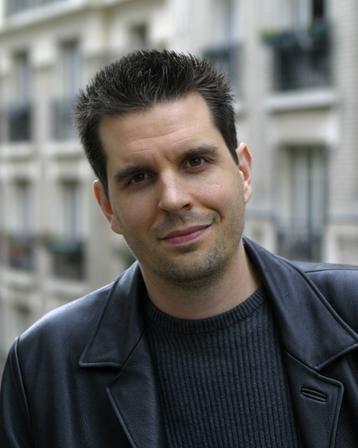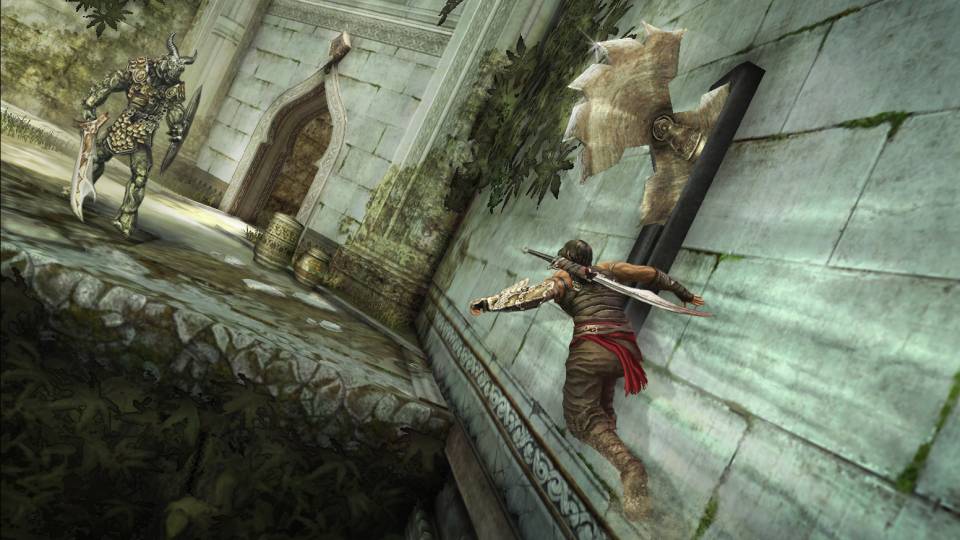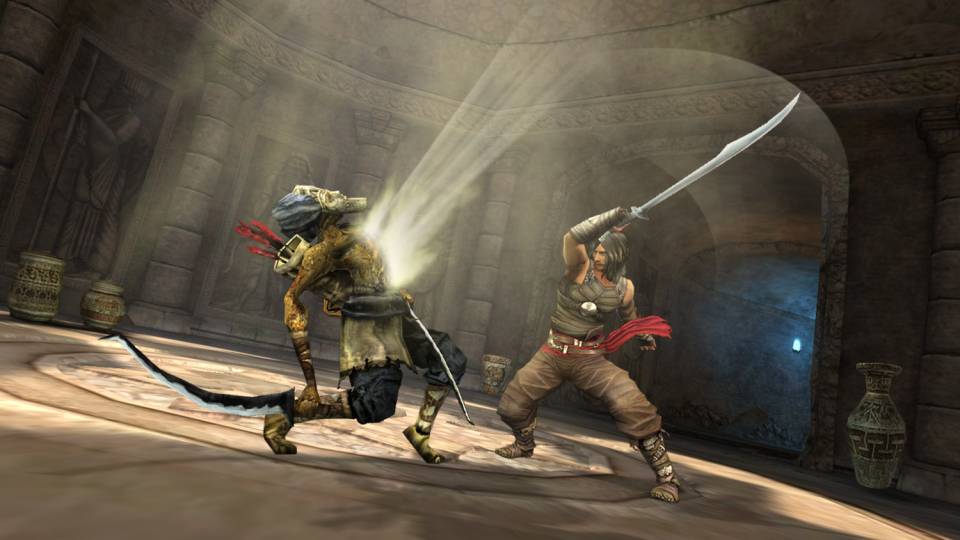
What was your role in the Wii version of Prince of Persia: The Forgotten Sands and how did you come about it?
McCaw: I wrote the story, dialogue and cut-scenes for the game. That said, writing a game is a highly collaborative process, and I worked very closely with Mario Lord, the game's creative director, and other members of the Ubisoft Quebec team. They made it fun, welcoming me from the beginning and coming up with a lot of great ideas.
My background is in screenwriting, and I came to the game from that direction. I had been hired by Ubisoft to pitch some ideas for short films set in the universe of Assassin's Creed. That project later went through many iterations, but they liked my work and recommended me for Prince of Persia. So, I flew up to Quebec to meet with the team. I remember seeing the concept art from the game -- different versions of the Prince, genies, and plant-like monsters -- and feeling like a kid in a candy store. I've always been a huge gamer and to be part of an iconic franchise was an awesome opportunity.
== TEASER ==
I have always been curious about the workflow in developing a script for a game. What is the process like throughout the development cycle, and when were you finally able to put the pen down?
McCaw: It is often necessary for games to go through a lot of development before a writer is brought on. Many elements of a game supersede the story: The graphics engine, game mechanics, combat, acrobatics, and in this case, tailoring the game to the Wii's hardware and controls. The team had also done substantial work on the levels, enemies, and environments. There were a lot of moving pieces! Part of my job was to incorporate all the work that had been done into a seamless narrative. At times, it was a bit like solving a puzzle.
I honed the story by writing several outlines and bouncing them off the team. We knew that certain elements (tutorials, cut-scenes, obstacles, and enemies) had to be in certain places, but the story was still open-ended: How would the Prince react to this strange and magical kingdom? How would he get along with Zahra, his genie companion? What motivates the evil force that's corrupting the land?
And most importantly, how could we make the game emotionally involving? Doing wall-runs and hacking apart demons is fun, but games increasingly demand a level of feeling akin to what you experience in movies. Part of this necessity comes from competition. Many games have eye-popping visuals, cool combat, and great level-design. Captivating stories and memorable characters are good ways of setting a game apart.
Once we had arrived at a story, I wrote the dialogue. While there were many in-game cinematics, the majority of character interactions came through voice-over. At lot of it is functional -- introducing enemies and traps and highlighting goals for the player. But since voice-over has few technical limitations, it was also an opportunity to flesh out the relationship between the Prince and Zahra. I enjoyed writing the banter that makes them evolve from wary partners to true friends -- it was one of the most rewarding parts of the experience.

Having written for both movies and video games, what are the big differences in approaching the two?
McCaw: When writing a movie, you rarely worry about technical limitations. This is especially true in fantasy, action, or science fiction -- if anything, you're trying to wow the reader with huge set pieces that capture their imagination. If those sequences become too expensive to make, it happens during production, when the writer's role is greatly reduced.
Games are completely different. You're always writing during production -- there's no way around it. And everything you do must fit within constraints: Character models, level design, animation, etc. You can't be like, "Whoa! Wouldn't it be awesome if the Prince jumped off a cliff and fell twenty stories while fighting that sorceress?," because a development team always has limited time and resources. They're under a lot of pressure.
The best part about writing games is the collaboration. This might seem counterintuitive because we tend to think of creative types as control freaks who want to impose their vision on the world despite the fact that games and movies require millions of dollars of other peoples' money. But when working with respectful partners, you can accomplish far more than you can on your own. Games are inherently collaborative because they're complicated and require teamwork. As such, writers are usually welcomed and treated as equals. In the movie business...not so much.
This game still takes place after 2003's The Sands of Time, but tells a different tale than the Xbox 360 and PlayStation 3 versions. How does this story fit into the Prince of Persia canon?
McCaw: It was vitally important to all of us to embrace the strengths of Sands of Time, which meant focusing on the Prince's character. Sands of Time made him powerful -- because he possesses great physical prowess and a magical dagger -- but also vulnerable, in that he craves his father's approval and wants to be with Farah. That duality is crucial to creating an interesting character and the Prince has always been more than a simple badass.
On the other hand, we also wanted the Wii game to be a completely stand-alone adventure that didn't require any knowledge of the franchise. That's why we gave the Prince a new problem and a new opportunity. He wants to set himself apart from his family and have a kingdom to call his own, but in the opening of the game, when Zahra leads him to such a place, he finds that it has some very thorny strings attached.
So, to answer the question -- we wanted to show a singular adventure in the Prince's life that could have happened any time between Sands of Time and the Xbox 360/PS3 version of Forgotten Sands. I like to think of it as one of the Seven Voyages of Sinbad -- you don't have to know one to enjoy another.

McCaw: As I mentioned above, the dilemma with the Prince is balancing the warrior and boy within. We admire his strength, agility, and courage; but, we can identify with his human needs like love, respect, and the desire to fulfill his own personal destiny. So in that sense, he is more of a Luke Skywalker than a Han Solo. He doesn't have to search for his moral compass -- he already has that. He simply needs to fulfill his potential.
Arabic folklore and Persian mythology were big sources of inspiration, not just for the story, but also for the game's amazing art direction. We read Sinbad, other stories from the Arabian Nights, and books about the Persian deities. We also drew on pop culture references. Raiders of the Lost Ark, The Mummy, and Pirates of the Caribbean were great templates for the kind of swashbuckling, flirtatious dynamic we needed between Zahra and the Prince.
Since this game bridges some of the time between other Prince of Persia games, can you give us a brief statement about the personal journey of the Prince from the beginning to the end of the game?
McCaw: He begins the game as a young but experienced warrior who thinks he's ready to take the next step and become a king on his own terms. When faced with a land in dire peril, he learns that the responsibility of leadership cannot be taken, it must be earned, but he can't make this discovery on his own. To achieve his goals, he will have to open his heart to Zahra, look past himself, and gain her trust.
Do you have any favorite moments or lines from the game?
McCaw: Every time the player acquires a new power, Zahra inhabits a statue at a magical shrine. To gain the power, the Prince must kiss the statue. I don't want to give anything away, but my favorite moment is the payoff for this recurring sequence later in the game. The idea wasn't even mine. It came from the team!
Finally, is there any advice you'd give to folks trying to get into the writing end of game development?
McCaw: Most game writers come from other media, so it helps to have experience in movies, television, comic books, or novels. In short -- learn to write, no matter how you do it. Make sure to listen to other people, especially those you trust, because game writing will require you to process input from a team. Finally, put yourself in a position to make important contacts. There are many ways to do this -- through friends, school, work, social networking, or going to conventions like E3 and the GDC. Try to talk to people in the game industry, learn what they want, and assemble a portfolio of scripts, stories, and pitches to use as samples.
And most of all -- don't quit! As Zahra would say to the Prince, it takes faith and persistence to overcome great obstacles.